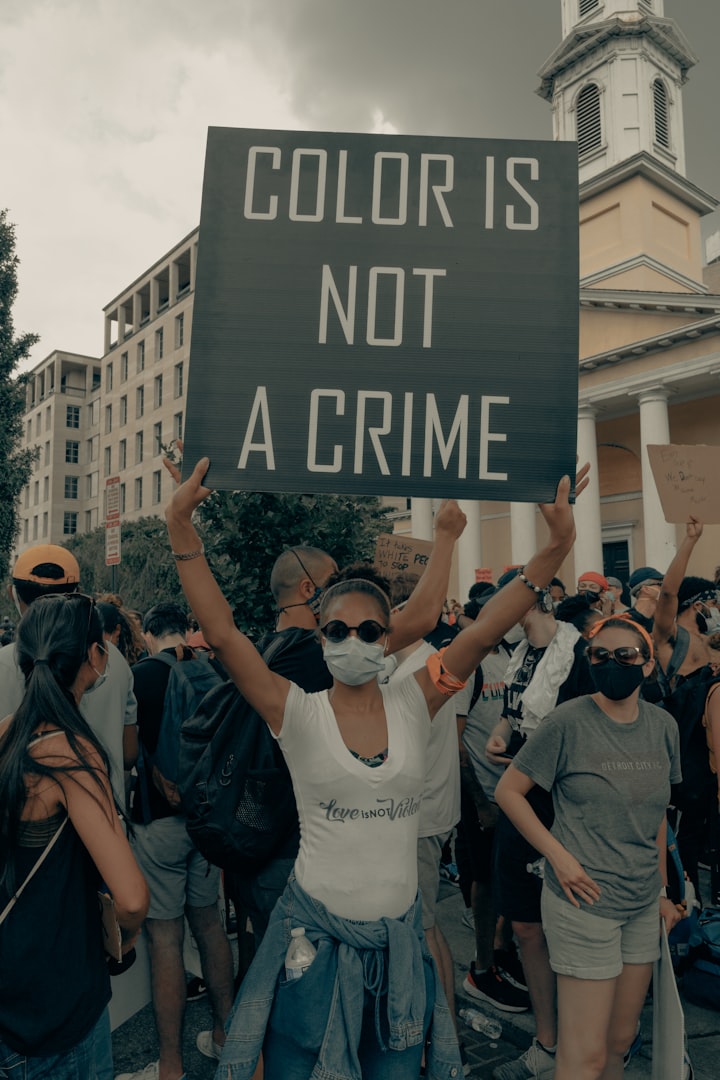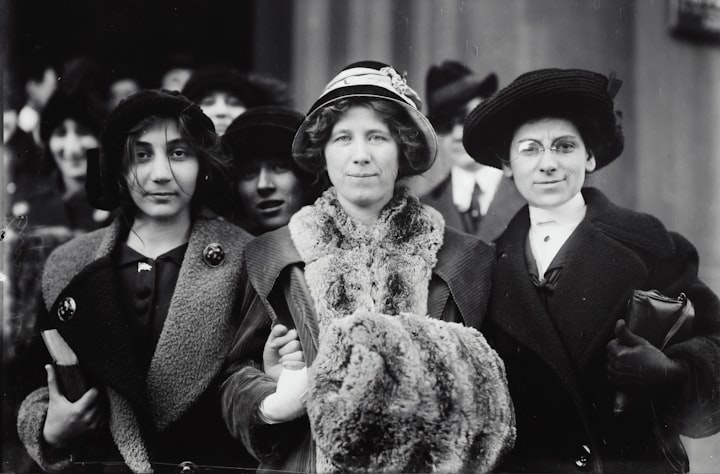Reverse Racism is a Myth
We have not been victims of racism on the basis of our whiteness, and here's why.

This article discusses racism/racial violence, slavery, and discrimination. Please read at your own discretion.
_________________________________
Racism: Definition, Causes, and Origin
Racism is a term that's been around for decades. The concept of race is believed to have emerged in English language around the seventeenth century, and the study of racism traces back to the nineteenth century. In the 1800's, racism became used regularly as an attempt to explain political conflict, and to justify colonialism in Europe. Although racism is frequently expressed through prejudice and discrimination, it's so much more than that. It's a concept driven by the desire for power that has been interwoven into society for centuries.
But how exactly can we define racism?
Racism is the belief that people can be divided into a hierarchy of power based on their race or ethnicity. It believes that humans can be divided into biological groups which will determine their success and behaviour, and that race determines traits and abilities. This, obviously, is completely untrue - but nonetheless, these beliefs lead to the oppression and segregation of people whose race is thought to be inferior.
There are many underlying causes of racism. Many have evolved throughout history, or been passed down from one generation to the next. Many respected scientists used racist ideals in their studies, which spread among humans interested in justifying racism. Due to racist portrayals in media and the deep systemic racism that built our society, people of colour face discrimination and misrepresentation on a daily basis. Sometimes racism is unintentional - humans fail to confront injustice, or find comfort in like-minded people who encourage racist action. Because of the frequency of racial discrimination in media, racism is often internalized by those who were raised to believe in their 'inferiority'.
Race Versus Ethnicity
To understand racism, we must first understand race. Race can be understood as a socially constructed concept, used by socially dominant groups to justify racial segregation, and to establish social meaning. In sociology, it's defined as the classification of humans based on a combination of their physical characteristics: such as skin colour or facial features. The idea of race as we know it is believed to have emerged sometime between 1500 and 1800, when millions of African people were taken by force by White Europeans to be used as slaves in the Americas. Classifying human beings by their colour and features allowed Europeans to justify their enslavement of Africans.
While race is used as a descriptor of physical features, ethnicity references cultural markers: describing a social group that shares a religion, culture, or language. The word ethnicity comes from the word ethnic, which is derived from a Greek word meaning 'nation' or 'people'. However, like most words, the meaning of ethnic evolved over time, and eventually developed xenophobic connotations when used to refer to citizens who were foreign or non-white.
Despite their differences, race and ethnicity are often used interchangeably - and they're ideas that remain highly debated among people of colour. I think it's important to note that race, like many things in society, is a social construct, and its validity is highly subjective.

Racism, Prejudice, or Discrimination: Understanding The Differences
As a white person, I'm often faced with backlash when I say that white people cannot experience racism. Much of this backlash, I believe, stems from the misconception that prejudice and discrimination are synonymous with racism. Understanding the differences is a stepping stone to becoming anti-racist, and with this, learning how to use white privilege to confront racism and racial prejudice.
Racism results from power - more specifically, an unequal distribution of power on the basis of race. It comes with an innate belief that race determines success and personal traits, and causes people to act on the basis of this belief. In comparison, prejudice is based on stereotype: an internal, adverse opinion or belief regarding an individual or group. For example, a hiring manager could be prejudiced against candidates with non-English names, believing them to be uneducated or unqualified. If we believe a stereotype against a marginalized community or cultural group, we develop prejudice.
If we take prejudice a step further, we get discrimination. Discrimination occurs when one allows their prejudice to influence their behaviour, moving from an internal belief to an external act of conflict. Discrimination exists in many areas: such as religion, gender, sexuality, age, and race. Although all types of racism are an act of discrimination, discrimination is not always an act of racism. The key thing to remember is that discrimination results from prejudice, and racism results from inequality of power.
The Oppressed Cannot Cause Harm to the Oppressor
Let me reiterate: saying white people cannot be victims of racism is not saying they cannot be discriminated against. Prejudice and race-based stereotypes can affect white people just as they can affect anyone else - but society has not been built on the discrimination of white people, and being targeted by racial prejudice will not result in us losing our job, or being falsely blamed for a crime, or being a target of police brutality.
Reverse racism isn't real because the oppressed cannot hurt the oppressor. Because our society was founded on racist beliefs and practices specifically meant to benefit white people, its very foundation is built upon racism. This means that every single law, policy, belief, behaviour, and institution in society is motivated and influenced by racist beliefs and ideals. To argue the existence of reverse racism is to assume that each group holds equal power, and we know that this is fundamentally untrue.
Societal practices and beliefs lead to a variety of types of racism: working together to perpetuate racist ideas, behaviour, interactions, policies, and social structure. Racial stereotypes and caricatures are common in art and media, encompassing a broad range of racist ideas. These ideas in media circulate society, spreading like wildfire, directly impacting our relationships and attitudes toward Black people. To further this, racism is often expressed through language. By using words that rely on stereotypical racial differences, we reaffirm the idea of racial hierarchy in society and perpetuate racist inequalities and attitudes.
How To Be Anti-Racist: Targeting White Supremacy and Systemic Racism
When it comes to ending racism, there is no room for neutrality. Neutrality implies apathy. Neutrality perpetuates the violence and segregation that Black people have been subject to for decades. Power carries responsibility. Power carries accountability. When we acknowledge the privilege and power that we carry as white people, we can begin to unravel the racist structures and attitudes that make up our society. Only those who construct an idea can deconstruct it. This means that only the oppressor can put an end to their oppressive behaviours and practices.
Anti-racism is an active and conscious effort to dismantle and overturn multidimensional aspects of racism. It comes with a responsibility and commitment to fight racism in every aspect, in every place it is found - even if this means confronting our own racial prejudices. Human beings are innately flawed. To acknowledge our subconscious biases is to face conscious discomfort and anger, and it's far easier to ignore discomfort than to confront it. By understanding that racism has existed for centuries, we can understand that the burden of its creation is not ours to bear. In spite of this, acknowledging our white privilege allows us to fight the very oppression we have benefited from.
Anti-racism begins with challenging our own unconscious bias. For some, this is the biggest hurdle. From here, we can put in the work to educate ourselves on the history and impact of racism, and to challenge the way we look at race and culture. Working to unlearn our unconscious racial stereotypes is a crucial step in the process of abolishing racism. We can do this by observing art and media by Black creators, and by seeking out the stories and experiences of the Black people in our lives.
Although ending racism is the job of the white people whose ancestors created it, it is mandatory to listen to the voices of those who have been oppressed by it. We must listen when we are told ways in which to practice anti-racism. We must listen when our racial bias is pointed out - because only those who are hurt by oppression have the right to decide what is oppressive.

Sources:
https://www.britannica.com/topic/racism
https://humanrights.ca/story/black-lives-matter-and-struggle-racial-justice-canada
https://www.healthaffairs.org/doi/10.1377/hlthaff.2021.01394
https://www.aclrc.com/myth-of-reverse-racism
https://www.thecanadianencyclopedia.ca/en/article/racism
https://www.dictionary.com/e/race-vs-ethnicity/
https://www.humanrightscareers.com/issues/root-causes-of-racism/
https://time.com/5865530/history-race-concept/
https://www.humanrightscareers.com/issues/who-started-racism/
https://www.thoughtco.com/racism-vs-prejudice-3026086
https://www.simplypsychology.org/prejudice.html
About the Creator
choreomania
i'm a a queer writer, poet, cat lover, and author. i'm passionate about psychology, human rights, and creating places where lgbt+ youth and young adults feel safe, represented, and supported.
29 | m.
follow me on threads for more.
Enjoyed the story? Support the Creator.
Subscribe for free to receive all their stories in your feed. You could also pledge your support or give them a one-off tip, letting them know you appreciate their work.






Comments
There are no comments for this story
Be the first to respond and start the conversation.